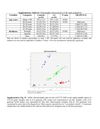 14 citations,
December 2016 in “Sexual Medicine”
14 citations,
December 2016 in “Sexual Medicine” Finasteride side effects in young men may be linked to specific gene variations.
 12 citations,
October 2004 in “Experimental Gerontology”
12 citations,
October 2004 in “Experimental Gerontology” Changes in testosterone and estrogen receptor genes can affect how men age, influencing body fat, hair patterns, and possibly leading to skin disorders.
 10 citations,
August 2020 in “Drug metabolism and drug interactions”
10 citations,
August 2020 in “Drug metabolism and drug interactions” The NUDT15 gene variant causes severe side effects from azathioprine in some Indian patients.
 4 citations,
January 2016 in “International journal of reproduction, contraception, obstetrics and gynecology”
4 citations,
January 2016 in “International journal of reproduction, contraception, obstetrics and gynecology” A certain genetic variation is linked to a higher risk of polycystic ovarian syndrome.
 1 citations,
September 2023 in “Acta dermato-venereologica”
1 citations,
September 2023 in “Acta dermato-venereologica” Certain genetic variants are linked to frontal fibrosing alopecia in Spanish patients.
 December 2023 in “Research Square (Research Square)”
December 2023 in “Research Square (Research Square)” These specific gene polymorphisms are not linked to Alopecia Areata in Egyptians.
 October 2023 in “Benha Journal of Applied Sciences”
October 2023 in “Benha Journal of Applied Sciences” PPAR-γ may be a key target for treating alopecia areata and other skin conditions.
 January 2021 in “Benha Journal of Applied Sciences”
January 2021 in “Benha Journal of Applied Sciences” Prolactin levels and gene polymorphism are not linked to vitiligo severity but are related to BMI.
 April 2017 in “Journal of Investigative Dermatology”
April 2017 in “Journal of Investigative Dermatology” The PON1 192R gene variant is linked to a higher risk of psoriasis and heart disease in Western Mexico.
 76 citations,
April 2005 in “Cancer Epidemiology, Biomarkers & Prevention”
76 citations,
April 2005 in “Cancer Epidemiology, Biomarkers & Prevention” E211 G>A gene linked to lower risk of severe prostate cancer and hair loss.
 26 citations,
November 2009 in “Journal of Endocrinological Investigation”
26 citations,
November 2009 in “Journal of Endocrinological Investigation” Certain gene variations are not a major cause of male infertility in Nigerian men.
 9 citations,
September 2015 in “Reproductive Biomedicine Online”
9 citations,
September 2015 in “Reproductive Biomedicine Online” Longer GGN repeats in the androgen receptor gene are linked to polycystic ovary syndrome.
 7 citations,
July 2020 in “Immunological Investigations”
7 citations,
July 2020 in “Immunological Investigations” The rs231775 genetic variant is linked to a higher risk and severity of Alopecia Areata in males.
 4 citations,
June 2015 in “Journal of Genetics/Journal of genetics”
4 citations,
June 2015 in “Journal of Genetics/Journal of genetics” Genetic differences within ethnic groups may affect prostate cancer treatment effectiveness.
 March 2016 in “West Indian medical journal”
March 2016 in “West Indian medical journal” There is no significant link between alopecia areata and the PON1 enzyme polymorphisms studied.
 7 citations,
January 2021 in “The journal of gene medicine”
7 citations,
January 2021 in “The journal of gene medicine” Certain genetic differences may affect how likely someone is to get COVID-19 and how severe it might be.
 19 citations,
August 1999 in “European journal of endocrinology”
19 citations,
August 1999 in “European journal of endocrinology” The study concluded that testing hormone levels after stimulation is not reliable for identifying carriers of 21-hydroxylase deficiency; genetic testing is necessary.
11 citations,
December 2013 in “International Journal of Dermatology” IL16 gene variations may affect the risk of alopecia areata in Koreans.
15 citations,
August 2010 in “Fertility and sterility” Metformin works better for adolescent girls with PCOS who have certain genetic variations.
Certain genetic variations are linked to hair loss in Mexican men.
46 citations,
October 2018 in “JCI insight” CD8+ T cells are involved in alopecia areata and may cause disease relapse.
42 citations,
July 2013 in “Gene” IL-4 gene variation may increase the risk of alopecia areata in Turkish people.
22 citations,
September 2020 in “The journal of investigative dermatology/Journal of investigative dermatology” The study's results on the effectiveness of low-dose IL-2 for alopecia areata and its impact on immune cells were not provided.
17 citations,
August 2015 in “Journal of Animal Science” The MTR gene affects wool quality and production in Chinese Merino sheep.
 11 citations,
April 2019 in “Bioscience Reports”
11 citations,
April 2019 in “Bioscience Reports” Certain genetic variations in the RAB5B gene are linked to a higher risk of polycystic ovary syndrome in Chinese Han women.
 June 2023 in “International Journal of Research in Dermatology”
June 2023 in “International Journal of Research in Dermatology” Certain gene variations are linked to severe acne in Egyptian patients and could guide treatment choices.
 November 2022 in “Scientific Reports”
November 2022 in “Scientific Reports” Certain ESR1 gene variations may affect hormone levels and fat distribution in women with high male hormone levels.
Certain KIR genes in Indian SLE patients are linked to disease severity and could be biomarkers.
 April 2011 in “Vestnik dermatologii i venerologii”
April 2011 in “Vestnik dermatologii i venerologii” Certain gene variations and irregular X chromosome activity may contribute to hair loss in women who can have children.
 December 2010 in “Vestnik dermatologii i venerologii”
December 2010 in “Vestnik dermatologii i venerologii” Certain genes and X chromosome patterns may significantly contribute to the development of hair loss.





















